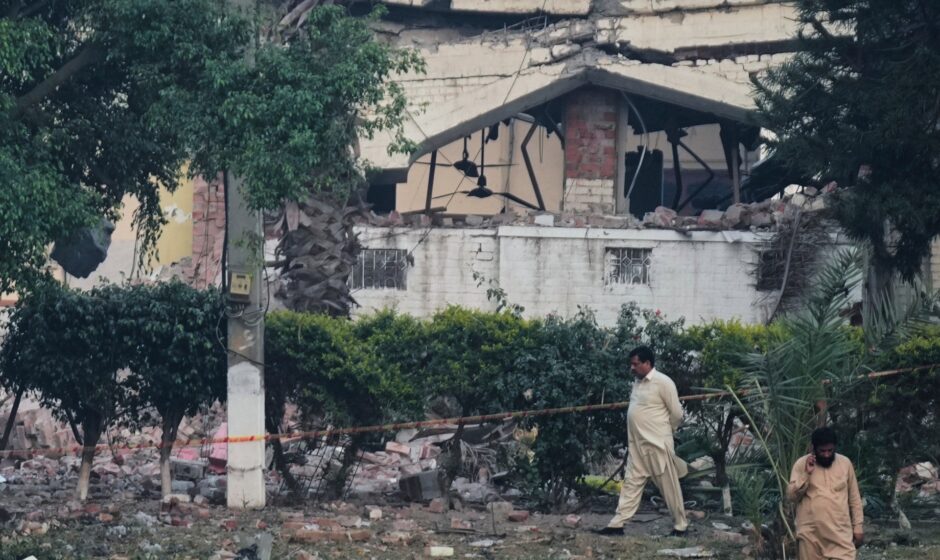New Delhi, India – As Indian military officials took the podium next to the country’s foreign secretary at a media briefing on Wednesday morning, after unprecedented missile strikes into Pakistan and Pakistan-administered Kashmir, a timeline of death played out on a video screen behind them.
The 2001 attack on the Indian parliament in New Delhi in which nine people were killed. An assault on the Akshardham Temple in the western city of Ahmedabad in 2002, in which 33 people died. The 2008 Mumbai attacks in which more than 160 people were killed. Several other attacks. And finally, the killings in Pahalgam, Indian-administered Kashmir, in which gunmen shot down 26 people on April 22.
The May 7 missile strikes on Pakistan and Pakistan-administered Kashmir were payback, New Delhi has said, for Islamabad’s refusal to crack down on armed groups that India insists have been financed, trained and sheltered by its neighbours over the past four decades. Islamabad denies that charge – though it acknowledges that some of these groups are based in Pakistan.
But the missile strikes were about more than retribution, Indian Foreign Secretary Vikram Misri suggested on Wednesday. The strikes, he said, were driven by “a compulsion both to deter and to pre-empt” attacks by armed groups launched on Indian territory. Misri accused Pakistan of failing to take “demonstrable steps” against “terrorist infrastructure on its territory or territory under its control”.
Yet as tensions between the nuclear-armed neighbours escalate hour by hour, with Pakistan accusing India of launching a wave of drones into its territory on Thursday, military and geopolitical analysts question whether India’s approach serves as a deterrent against armed groups eager to target it. They argue that New Delhi’s actions are more symbolic and aimed at addressing its domestic audience rather than tactical advancement in the so-called “fight against terror”.
“This is all a domestic theatre,” said Ajai Sahni, executive director of South Asia Terrorism Portal (SATP), a platform that tracks and analyses armed attacks in South Asia. “The Indian strikes [in Pakistan] have no deterrent value.
“The aim of the strike has nothing to do with military takeaway – the aim [for Indian Prime Minister Narendra Modi] was to speak with his own domestic audience,” Sahni told Al Jazeera. “And [Pakistan’s pledge] of retaliation is to speak with the audience of the other side. That is the genius of it – that both sides will claim victory from this.”
‘Justice is served’
The Indian army and Foreign Secretary Misri argued on Wednesday that the country’s security forces had been precise and careful in the selection of their targets.
Among them was Muridke, next to Lahore, Pakistan’s second-most populous city, and what India described as the Markaz Taiba camp of the Lashkar-e-Taiba (LeT), the group behind the 2008 Mumbai attacks.
At the media briefing with Misri, Indian Army Colonel Sofiya Qureshi referred to the site as the place where key perpetrators of the Mumbai assault – including Ajmal Kasab, the sole gunman who was captured alive – were trained. More than 160 people died in the Mumbai attack.
India also hit Bahawalpur, which New Delhi claims hosts the headquarters of the Jaish-e-Muhammad, an armed group behind the 2019 suicide bombing attack in Kashmir in which more than 40 Indian paramilitary soldiers were killed.
“Justice is served,” the Indian army noted in a post on X as early reports of the missile strikes poured in on Wednesday, 15 days after the Pahalgam killings. The Indian missile strikes killed at least 31 people in Pakistan – all civilians, according to Islamabad – including two children. India has denied that it targeted civilians.
But Pakistan has threatened to hit back, and after Thursday’s drone attacks, the South Asian nations are even closer to a full-blown military conflict. Any hits taken by armed groups from Indian missiles won’t fundamentally change their ability to target India, said Sahni.
“All these strikes will result in are certain tactical and operational adaptations,” said Sahni.
‘A renewed armed movement’
That – an adapted strategy on the part of armed groups – is precisely what was on display on April 22, when gunmen attacked tourists in Pahalgam, say experts.
In February 2019, after the suicide attack on Indian troops, Indian warplanes pierced Pakistani airspace and bombed Balakot in Khyber Pakhtunkhwa, where New Delhi claimed it hit “terrorists’ camps”. As Pakistan scrambled jets in response, a dogfight ensued, and an Indian Air Force jet was shot down. Pakistan captured the Indian pilot before returning him 60 hours later.
Both nations claimed victory – the Modi government in New Delhi said it had entered Pakistan and bombed “terrorists”, while Pakistan highlighted its downing of an Indian jet and the capture of a pilot as evidence that it came out on top. And so neither side, say experts, felt the need to really change.
That’s why Sahni said he believes no matter how the current tit-for-tat threats and attacks play out, they won’t alter long-term calculations for any of the actors involved. Instead, “the tensions will resurface, perhaps in different forms.”
A Kashmiri political analyst – who has seen India-Pakistan wars in 1965, 1971, and 1999, and three decades of Kashmiri armed rebellion against Indian rule – agreed. “If it was supposed to work, then Kashmir would not be standing where we are today,” they said, requesting anonymity, fearing reprisal from Indian forces. “One of the world’s most volatile flashpoints.”
Six months after the Pulwama attack, New Delhi unilaterally revoked the disputed Kashmir region’s partial autonomy and broke down the erstwhile state into two federally governed territories in August 2019. China and Pakistan, India’s neighbours that both control parts of Kashmir, condemned the move.
India then imposed a clampdown in Kashmir and arrested dozens of political leaders, journalists, and human rights activists, even as the Modi government claimed the region was returning to “normalcy”. Despite that – and the hundreds of armed rebels killed by Indian security forces over the years, “the armed movement continues,” Sahni pointed out.
“The movement keeps on renewing itself [despite India’s countermeasures for three decades],” noted Sahni. “In the current attack, there has been a certain loss of material – buildings have been blown up – but if there is implicit support for these groups in Pakistan, they will always come back.”
‘A fiasco’
In the early hours of Wednesday, the Pakistani military claimed it had downed at least five Indian warplanes that had been involved in the missile strikes. Local Indian officials and security sources confirmed to Al Jazeera and other media outlets that at least two fighter jets had “crashed”, though Indian officials have not commented on the issue publicly.
If the jets indeed belonged to the Indian fleet, “it will become difficult for India to make a decision in the future about sending in aircraft to impose punitive strikes on Pakistan,” said Ajai Shukla, a defence and strategic affairs commentator, who served in the Indian Army from 1976 to 2001.
Shukla noted that while a planned and rehearsed strike would have deterrent value, “the realities eventually depend on how much loss has been inflicted, compared to losses incurred.
“It’s a moment where India needs to pause and think,” added Shukla. “Even when both countries claim victory, at least one of them in their heart of hearts knows that this was not a victory. This was something that turned out to be a fiasco.
“If there is going to be an attitude that we will not admit anything and we will declare victory, then probably that weakness will never be eradicated,” Shukla said.
To Sahni, there’s a more imminent danger that has arisen from the strikes over the past two days. Previously, he said, both sides acted within unspoken but accepted “calibrated limits”.
Not any more.
“There are no clear lines on what is ‘escalation’ now,” he said. “And that’s the classic slippery slope, on the edge of a risky spiral.”
#deterrent #Indias #strikes #Pakistan #stop #armed #attacks #IndiaPakistan #Tensions #News


